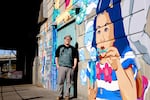
Alex Chiu stands by his mural at the platform of the 82nd Avenue Max Train Station.
Ericka Cruz Guevarra / OPB
The color scheme of the mural Alex Chiu painted on 82nd Avenue leans on baby blues and pinks.
There are also varying shades of tans and browns, filling in the flesh of people — real people — whose portraits Chiu painted based off photos.
His subjects were people who work with youth in Portland, and the themes of the mural are universal. It's a storybook-like series of panels following Chiu's young daughter, Mazzy, as members of the community teach her how to dance, play the piano and read.
"They're very relatable themes," Chiu said of his artwork at the 82nd Avenue MAX station. "But there's something about this political climate that's dividing people."
Chiu has struggled to wrap his brain around why these seemingly innocent images of kids blowing bubbles and people sharing a meal made some passers by so, so angry.
Take, for example, the man who approached Chiu one day while he painted.
"He came and he said: 'You know, I see this mural, and I see that you're trying to make a statement,'" Chiu said. "And I said, 'Oh, thank you, I appreciate that.' And he said, 'Your statement is that white people don't belong here.'"
That same man returned again and again.
"No white people," he screamed at Chiu. "There's no white people in your art."
Never mind that there were white people in the mural.
Another time, another person walking past asked Chiu if he knew that 80 percent of Portlanders are white.
"Are you saying 80 percent of people in my mural have to be white?" Chiu asked himself.
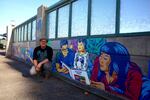
Alex Chiu next to a panel of him and his wife reading a book to their daughter Mazzy.
Ericka Cruz Guevarra / OPB
People threw water bottles at him as he painted. Once, someone came up from the train platform to tell him that his mural was "s---."
Maybe it was, Chiu thought.
But he also believes critics may not have responded that way if he wasn't Asian American. He wondered: Could the negative reaction be a product of the current political climate, one in which white men and white people more broadly are feeling disenfranchised? Maybe the blowback came because he wanted to celebrate diversity and multiculturalism, two notions under attack right now.
Maybe it wasn't about the images of the kids blowing bubbles, but the color of their skin.
"What's difficult for people of color sometimes is I don't know if a lot of these things are racially motivated or not," he said, "but it's something that I have to think about."
Chiu, an artist and illustrator who teaches animation and cartooning, was picked by TriMet to paint the mural as part of its attempt to remake the Blue Line route that stretches from Hillsboro to Gresham.
The transit agency considered various local artists, but it was Chiu's idea to paint people from the community that stood out.
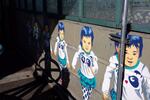
Chiu's daughter, Mazzy, on one of the mural panels
Ericka Cruz Guevarra / OPB
"I’m always looking for artists to show me something I can’t see," said Victor Maldonado, a local artist and assistant professor at the Pacific Northwest College of Art who was on TriMet's selection committee. "I mean that’s the value of art, that we can offer each other perspectives."
Chiu's proposal resonated with Maldonado, who is Mexican American. It seemed to offer a counter-narrative to Portland's reputation as "the whitest city in America."
"I keep thinking like, 'How many people of color need to be here to be visible?'" Maldonado said. "I think that [narrative] shouldn’t erase the people of color that are here. And I think as a person of color who works in white majority spaces, it's really taxing and demoralizing to hear that you don’t matter, that you don’t count."
Maldonado said he thought Chiu's mural would give visibility to the people of color erased by Portland's reputation as being almost entirely white, and in many ways, he says, the mural did its job. People noticed — just sometimes not in the way Chiu and even Maldonado hoped.
The response to Chiu's mural was, for the most part, positive. As Chiu posed for a photo by the finished mural recently, a man several feet away yelled to him, "Great mural, man," then thanked him.
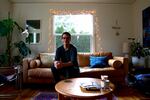
Victor Maldonado at his home in Portland.
Ericka Cruz Guevarra / OPB
But the negative reaction ate at Chiu enough that he went online to express his frustration during the work. He wasn't expecting anyone to offer help, or to feel sorry for him; he just wanted people to know what he was experiencing.
The pushback occurred just a few months after conservative groups and supporters of President Donald Trump protested on 82nd Avenue and the deadly MAX train attack by a white man screaming racist slurs just 40 blocks away.
"Over the past few years, I definitely have a fear of racial profiling and discrimination and violence," Chiu said. "And I feel like to have a situation like the MAX stabbing happen, it feels like a confirmation at the violence is real and that the violence is out there."
Maldonado saw Chiu's post about what he was going through.
"When Alex got threatened verbally, it wasn't hard for my imagination to go to red alert," Maldonado said. "But I think that's a condition that a lot of people of color feel. Honestly, being harassed isn't a surprise to people of color."
Still, he felt personally responsible for putting Chiu in danger. He reached out to ask what he could do to help.
"I immediately saw that I was not the only one," Maldonado said.
People of color who saw Chiu's post began organizing. They put together an online poll, scheduling time for volunteers to watch over Chiu as he painted. Often, his new companions were people Chiu hadn't met before.
Amy Franco, who helped organize the scheduling system, didn't take what was happening to Chiu lightly.
"Especially lately, and especially in this neighborhood," said Franco, who identifies as Latinx.
People turned out in one- and two-hour shifts for about two weeks in September. Franco, who moved to Portland from Chicago a year and a half ago, said moving to Oregon has been an ongoing process to find community.
"It's really disappointing to have something so positive in your community take on that tinge of discrimination and danger," she said. "And so we all just wanted to be there."
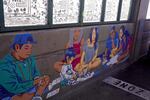
A panel on Alex Chiu's mural depicting members of Asian Leaders for the Liberation of Youth, an Asian Pacific American Network of Oregon (APANO) program, teaching Chiu's daughter Mazzy how to write her name.
Ericka Cruz Guevarra / OPB
For Chiu, posting about the harassment
online was about trying to receive psychological support. What was happening was damaging to his spirit, he said.
Chiu says he has nothing against the people who were so angry at him. He reported the incidents to TriMet, which eventually offered private security as he worked. The security was there for about four or five days, then Chiu told TriMet he didn't think it was necessary.
"I was a little embarrassed by it," he said. "It's not easy to accept help from other people."
All he wanted was to paint this mural, to celebrate the people who make Portland and 82nd Avenue so unique despite Portland's homogenous reputation. It was just supposed to be his way of processing what was happening to the country; he wanted to make sense of it all by creating something positive.
"I feel like people of color here are trying to figure out their place and coming together to figure out how to be impactful in Portland or have a voice in Portland," he said. "I want to try to be part of that."
For Maldonado, the reaction to Chiu's mural is reflection of a "myth of scarcity" in the United States.
"When they see us as artists making art in public spaces, part of them, I think, wants to take claim to the space," he said. "And I think white people are very used to taking up all the space."
Maldonado says that's another reason why Chiu's mural is so powerful — it visualizes a living culture and does the radical job of taking up space.